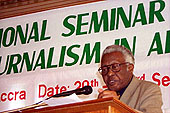|
|
 |
MISA Manyarara Prize Prize for investigative journalism in Southern Africa The Media Institute of Southern Africa (MISA) awards the Manyarara Prize for investigative journalism each year in cooperation with NiZA.
The award was set up to encourage journalists in Southern Africa and to reward them for their choice to work in this high-risk genre of investigative journalism.
The award pays homage to Judge John Oliver Manyarara. As a radio journalist and judge sitting on the Supreme Court of Zimbabwe, Manyarara was a strong advocate for the freedom of expression in Zimbabwe. He continues to work to improve the freedom of the press in his country. The Manyarara Prize is an initiative of MISA (Media Institute Southern Africa) and NiZA.
 | | John Oliver Manyarara |
The winner receives 2000 euros and a 10,000 euro scholarship, sponsored by PSO. The Manyarara Prize is awarded every year around 3 May, the international day of the freedom of the press.
Tied for first place in 2006: Stefaans Brümmers, Sam Sole & Wisani wa ka Ngobeni, and Mabvuto Banda
Tied for first prize this year. The award went to Mabvuto Banda from The Nation from Malawi, and Stefaans Brummer, Sam Sole & Wisani wa ka Ngobeni from the Mail & Guardian from South Africa.
Banda received the award for his article entitled ‘Mwana Uses Government Funds for Wedding’. The journalist exposed how Malawi’s former Minister of Education, Mwana, used public funding to pay for his wedding in a chique hotel. The article led to the resignation of Minister Mwana, who was sentenced to twelve years in prison.
The Mail & Guardian team won with their exposé series on the Oilgate scandal. The journalists researched the eleven million Rand in tax money that allegedly ended up in the treasury of the ANC on the eve of the 2004 elections.
Winners in 2005: Hilary Mbobe
The Malawian journalist received the award for his report on ‘Debts and Daughters’, which was broadcast in June 2004 on Inter-World Radio. The report was about the practice of ‘Kupimbira’, in which families sell their daughters to pay off their debts.
Mbobe’s production was based on the experiences of a 14-year-old girl who was sold as a bride at the age of ten by her father, who was deep in debt. The jury felt that Mbobe’s report broke social taboos to show that investigative journalism is not restricted to exposing corruption and mismanagement. Listen to ‘Debts and Daughters’.
Winner in 2004: Jacques Pauw
SABC journalist Jacques Pauw and his team from ‘Special Assignment’ (a programme aired on the South African public broadcasting network) won with his broadcast on a drug-smuggling route through Eastern and Southern Africa.
For four months, he conducted his investigations in Tanzania and Mozambique, among others. Pauw tracked down various drug addicts and dealers to highlight the problem of addiction in the region. The work often put Pauw and his cameraman Jan de Klerk into dangerous situations during filming. The jury was very impressed that Pauw successfully created a very good investigative report despite the danger involved.
Winners in 2003: Mzilikasi wa Africa and Jessica Bezuidenhout
After four months of digging, the journalists from the South African Sunday Times brought a corruption scandal to light in 2002 concerning the sale of the Komatiland state forests.
The company that won the tender procedure, Zama Resources, turned out to have given a ‘wedding present’ of 61,000 Rand to the head of the committee that assessed the tenders.
After the revelation, the government annulled the sale to the company and the official who took the bribe resigned. The sale involved an amount of 335 million Rand.
Winner in 2002: Conrad Nyamutata
Nyamutata (reporter for The Daily News, Zimbabwe) was rewarded for his brave investigation into the bombing at the offices of the Zimbabwean opposition party MDC (Movement for Democratic Change) in Harare, on 11 September 2001. Nyamutata presented a plausible case for policy and secret service involvement in the attack. (more...)
Winner in 2001: Lynne Altenroxel.
Altenroxel (journalist from The Star daily newspaper) won the first Manyarara Prize for her exposés of a large-scale bribe affair in the medical sector in South Africa.
(more....)
| |
|
|

|
 |  |  |  |
|

